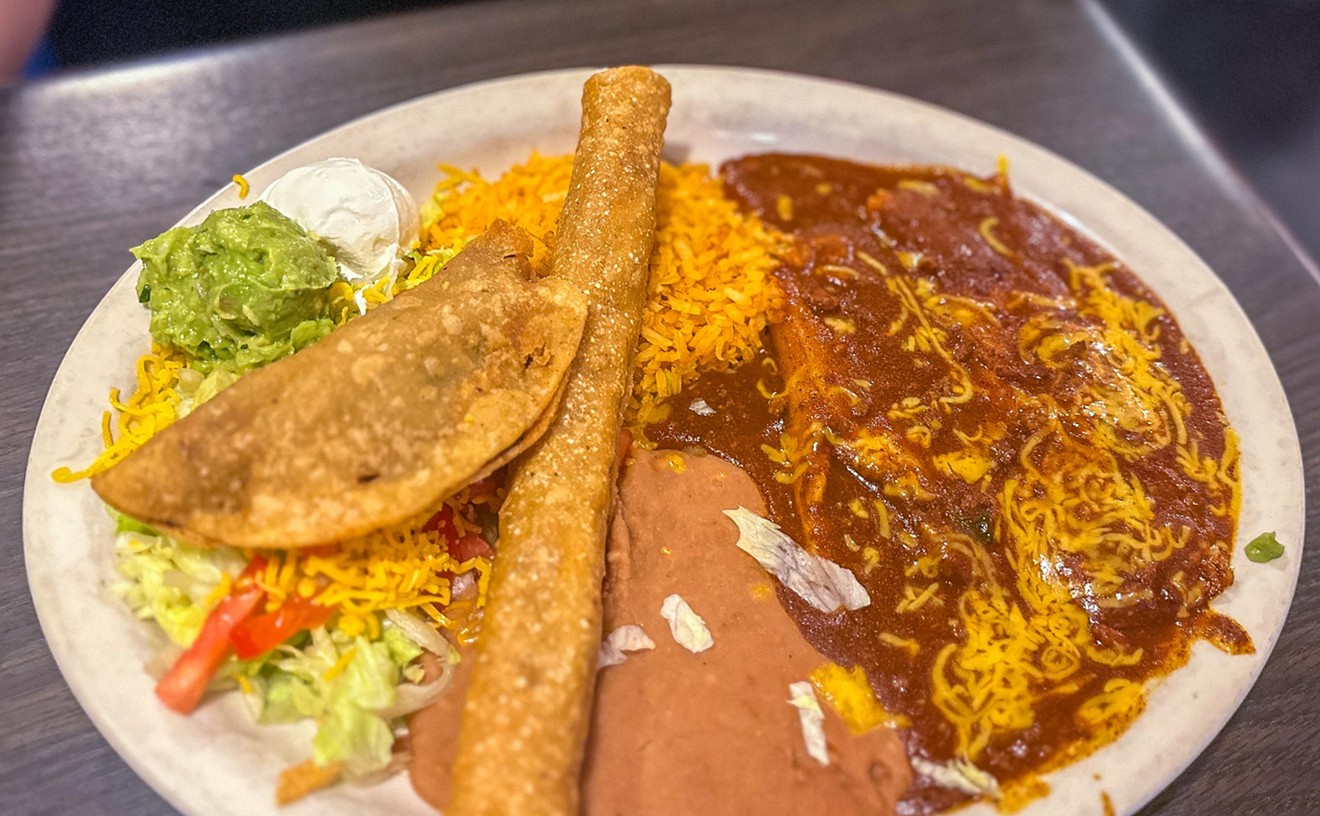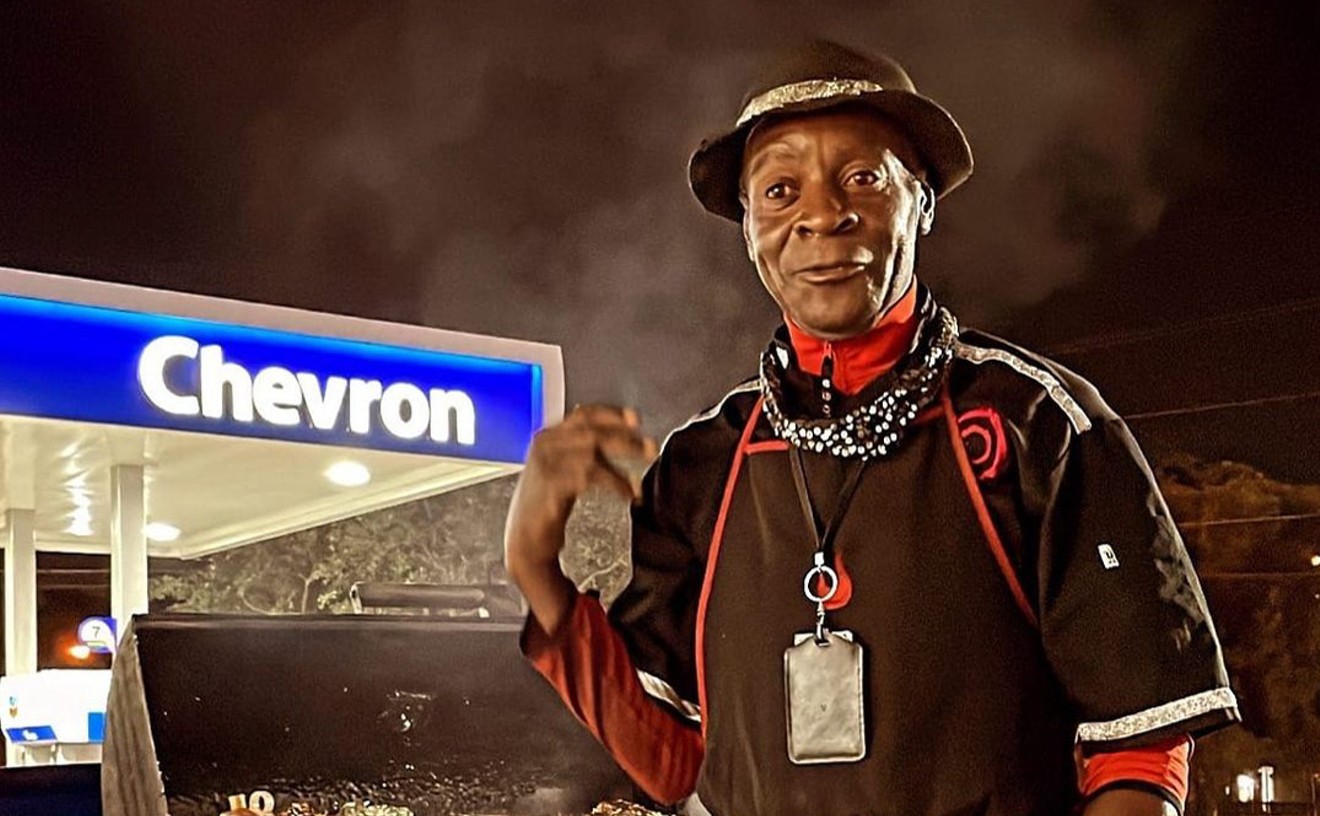Nicola Calamari, 51, executive chef at La Fiorentina, is a quiet man who looks you in the eye when he talks. He doesn't mince or waste words, but he doesn't hold back either. What he wants from people is the same consideration. What he expects from food is equally clear.
The man behind the kitchen in Alberto Lombardi's most recent endeavor is new to Dallas, but he brings more than 20 years experience with Italian cuisine to the table. His various stops include posts as chef at Trattoria Anita and Trattoria Í Cché c'è c'è in Florence; Guido's in Los Angeles; Luisas in Santa Monica, California; and executive chef at Vigilucci's Seafood & Steakhouse in Carlsbad, California, among others.
"I'm looking for the quality of the food," Calamari says. "I'm looking for food that already has flavor. I don't like to cover a piece of meat. You shouldn't have to have a sauce to hide it. You want a very mild sauce and really good meat. When we buy produce [at La Fiorentina], it's the same thing. We don't buy the cheap ones that you have to invent some sauce to cover the bad flavor. If it's not right. It's better not to use it."
Calamari clearly takes a great deal of pride in his ingredients, and the same goes for the food he serves. When people come to eat at La Fiorentina, Calamari, says, "It's like they come to my house, because I'm preparing everything with one guy in the morning, because the kitchen is small. I have my way to cook the food. The osso buco, I cook it personally. I cut the fish. I really like to get involved in daily work that I have in the kitchen. The most important thing is the freshness and quality of the food. Simplicity. Don't use heavy creams. Be as natural as possible. And we use the grill to cook our meat."
How Calamari came to Dallas from California is a bit serendipitous. La Fiorentina needed him just when he needed a new home for his cooking. "I have a friend that is here in Dallas that is working for Lombardi, and we're friends for I don't know how many years, and we talked about this before in the past," Calamari explains. "I got divorced and other things happened. But when they offered me the job, I said no because of my daughters. By September I really had nothing to do."
So, the second time around, he said yes. "I still miss [my daughters]," Calamari says. "But we keep talking once a week, and the rest is history. There is nothing better than showing what you can do and someone saying, 'Wow, you're good. I want you to stay.' I like to show what I can do. I'm not a talker. Things are black and white. I just say it like it is."
His cooking certainly speaks for itself. His oven-roasted Nigerian colossal shrimp are the size of lobsters and even more tasty. His twice-baked truffle-potatoes made even this generally non-potato liking or eating girl a bit teary when the last bite was gone. And his osso buco is tender and flavorful and served in a massive portion with the bone and marrow in the center of the plate. For dessert, I had the Napoleon with mixed berries and crema pasticcera. It was light and crisp and sweet and a surprisingly generous portion.
La Fiorentina is filled with wood from the original building, giving it a warm, timeless feel. The kitchen is open to the dining room and has a massive stone oven the center. A stained glass from the original Lombardi's restaurant hangs over the massive front door, which is originally from an old monastery. The kitchen walls are freshly tiled, and the dining room walls boast a rich, burlap-like paint technique and still life paintings.
It's an entirely new setting from some of the restaurants in California where Calamari worked, like the one in Carlsbad separated from the ocean by nothing more than the highway. "It was nice, nice, nice," Calamari says, "And busy all the time. The last one that I opened was in Coronado Island. I lived there for a like a year. I had to leave. I needed some time on my own. You get to a point where you have nothing left to give to a place."
He certainly has no desire to return to Italy. "Are you kidding me?" he says. "This is the place to be. Once a year I go back there. I love Italy. That's the place for vacation, but no more than two weeks. I miss the U.S. when I'm there. Still, Italy is beautiful. I like the countryside. But everyone has a big car and they go out and still complain about the government and everything. I don't understand that culture anymore. They have all these things and still complain. I can't figure it out.
"There is a huge difference in culture [between Italy and the United State]," he continues. "Things here move at a good speed. You can get anything you want here. This is still a country of possibility. If you have a dream and work hard enough, definitely you will get there. I don't think people realize what they have here, to be honest. It's too easy to complain."
And what's the culture of being a chef like these days? He sits thoughtfully before answering: "I don't know if people understand how much energy you have to put in a kitchen to make things happen. And it doesn't always happen [the way you want] even if you try very hard. You can try and try and sometimes it doesn't work out. There is nothing easy in life, especially cooking. Consistency is the name of the game. In a restaurant you can't just work 12 hours one day and five hours the next. I have to know what happens from the beginning when someone in the kitchen first touches something."
That's the thing about Calamari, he likes to keep things simple and to stay on top of what's going on, because, he explains, "You can't know everything. But you can try."










